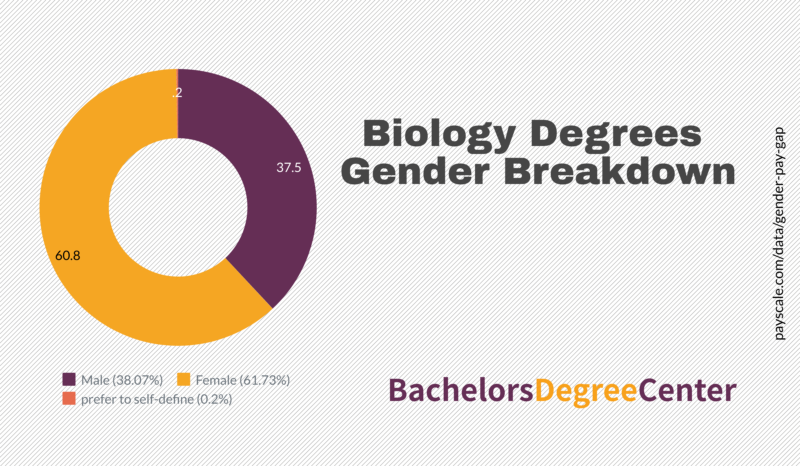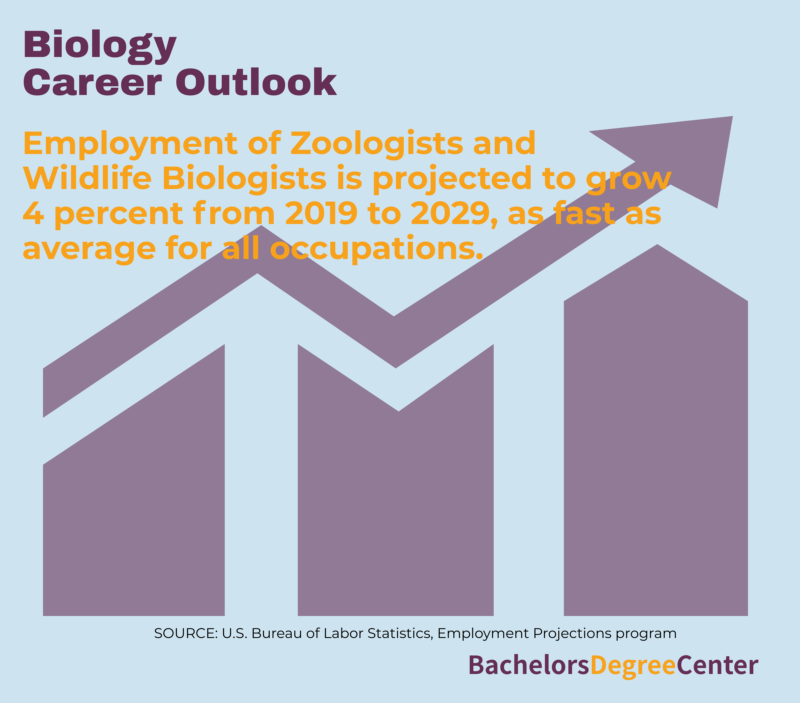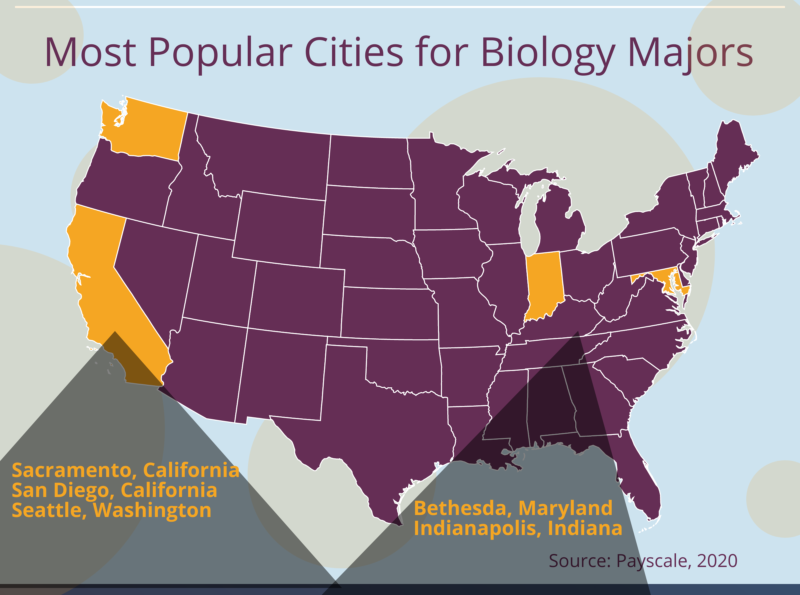Key Information:
- The programs include a broad range of specializations such as ecology, zoology, genomics, and biomedical engineering.
- Graduates can pursue careers in research, healthcare, environmental conservation, and education.
- Numerous organizations support biologists by providing specialized resources, professional development, and networking opportunities. These organizations, such as the American Institute of Biological Sciences, the American Society for Microbiology, and the Royal Society of Biology, cater to various specializations within biology.
Biology is an incredibly diverse field, and biology bachelor’s degree programs are just as diverse. While it is the study of all living things, it must be remembered that it encompasses thousands of different species of plants, animals, birds, mammals, amphibians, reptiles, and many other types of living things. Studying living things entails learning everything about them including their behaviors, how their bodies work how they think, what they eat, and almost any other question you can think of as to what, how, or why, an animal is a way it is. Because biology is such a wide-ranging and diverse subject, the number of specializations is staggering and the list continues to grow.
What Is A Biologist?
A biologist is a scientific professional who studies living organisms, no matter how large or small. They study everything about them, including their eating habits, how their bodies work, and their behaviors. This applies to plants and other types of vegetation as well. By learning about how living organisms grow, develop, procreate, and basically sustain life, a biologist can come up with medications, treatment options, identify potential health problems, and even improve the environment. Because a biologist works with many different types of living organisms, they are able to understand how the universe works as a whole and how we can take better care of our environment.

Accreditation for Biology Programs
Accreditation for schools and biology Bachelor’s degree programs is essential if graduates of these programs want to be taught the most accurate and up to date information possible within the industry. Accreditation is the ultimate verification that a school and its degree programs are at the highest level of academic excellence. Degree programs and learning institutions that receive this type of acknowledgment are considered to be the best possible choices if a student wants to have the necessary skills and abilities they will need to succeed in their chosen profession.
Accreditation is not a one-time deal. Once a degree program or learning institution has been recognized and accredited, it must go through the review process on a regular basis to maintain its accredited status. If at any time it fails, it will have to go through the entire process all over again to ensure that it continues to meet or exceed industry standards.
Institutional accreditation is sometimes referred to as “regional” accreditation. This type of acknowledgment is given to colleges and universities as an “institution”. Unlike a specialization accreditation that only recognizes a specific degree program, and institutional accreditation verifies that the learning institution as a whole has met or exceeded the board’s requirements and has received the nod of excellence in education. Institutional accreditation must be reviewed every year or so to determine that is continually meeting the required standards set forth by the accrediting board.
Specialization accreditation is reserved for degree programs within a specific specialization. Biology degree programs can include those for a marine biologist, microbiologist, nature conservation, and many others. A specialization accreditation focuses on each individual degree program and offers approval based on the individual standards that have been set for each program. Specialization accreditation provides validation to each specialization so that students who choose to pursue those degrees know that they are receiving the best education possible and will have the best possible chance for a lucrative and productive career.
Accrediting organizations for biology degree programs include the American Society for Biochemistry and Molecular Biology, as well as several regional accreditation bodies located throughout the country. The ASBMB works to recognize the efforts of degree programs by ensuring that they continually maintain the highest possible academic standards. Universities and colleges can use this accreditation status to gain funding so they can continue to provide the highest quality of education to their students. Accreditation also gives the school access to a testing program that is designed to evaluate a student’s progress and determine the program’s overall effectiveness when it comes to providing the most accurate course materials.
For students, this means that the curriculum they are following has been verified to surpass the set of standards in place within their chosen industry. They will receive more than adequate training in terms of communication, ethics, team building, and safety. Students will also have access to an optional degree certification exam that will show how competitive they are when compared against their peers and other graduates from similar degree programs.
Employers can hire graduates who enrolled in an accredited program knowing they were provided with the highest quality education possible. The graduate will be able to perform a variety of tasks using the skills and abilities they received from a degree program that provides the best educational resources possible. Accredited programs produce graduates that rank at the top of their programs. They are of the highest caliber and will be effective communicators.
Types of Biology Degrees
There are many different types of biology degrees that students can choose from. Many biology degrees can be found that include the courses offered for an Associates’ degree. This cuts the number of years for both programs, allowing a student to obtain their Bachelor’s degree in approximately four years. In the future, individuals who have earned a Bachelor’s degree in biology can explore many new opportunities. Specializations continue to include more and more job descriptions which will allow students to fine-tune their career goals.
Coursework for a bachelor of science degree or other biology undergraduate degree will focus heavily on research skills

Online Bachelor’s Degree Programs
Online Bachelor’s in Biology degree programs are beneficial in many ways. Not only do students enjoy a flexible schedule, but they can also attend any college or university they choose that offers the degree program they are looking for. Students who do not do well in a classroom setting or with large groups of people can thrive in an online learning environment. They have access to all of the same course materials as well as to the faculty and can perform their homework whenever it fits into their schedule. Students are able to maintain a full class schedule and maintain a full-time job so they can continue to care for their families. If they are lucky enough to be already working in their chosen career field, the experience they receive will be extremely beneficial on many levels.
Traditional Bachelor’s Degree Programs
A traditional Bachelor’s degree is the best choice for students who need the strict structure of a classroom setting. In a classroom, biology majors have immediate access to the instructor and can physically see what is going on around them. They have a more hands-on learning experience that reinforces what they are seeing and hearing. Many students feel that being in a classroom offers a more powerful learning experience because they are immersed in the environment. When it comes to biology degree programs, attending a traditional classroom setting gives students an opportunity to do their lab work in an actual lab setting, complete with everything they need to perform each task. A major in biology needs hands-on learning!
Just a few specializations include:
- ecology
- zoology
- ecosystems
- genomics
- evolutionary biology
- environmental science
- biomedical engineering
- crime scene investigation
Certificates in Biology
Another type of course offering is a Certificate in Biology. Certificates serve many purposes. They can be used to meet the required number of continuing education hours that are needed to maintain licenses and certifications. Certificates can also be used to validate a person’s past work experience. If a person has held the same job for many years but never took the time to return to school to earn a degree, the certificate they earn will provide them with the credentials they lack. Certification programs can range from six to eight weeks or six months to a year, depending on the type of program and what skills are being offered. Certificate programs are great for filling in gaps of knowledge between degree programs and will work well for someone who needs credentials until they can get enrolled in a Bachelor’s or master’s degree program.
Many biomedical students will choose medical school or other healthcare graduate programs.
Careers in Biology: What Can I Do with a Bachelor’s in Biology?
Biology is a very diverse career field. It covers all types of life forms in both the flora and fauna genres. It also includes the study of microorganisms, cells, and tissues, and how they relate to the life forms they belong to. Students who choose to pursue a Bachelor’s degree in Biology normally do so because they are interested in learning about the world around them. When it comes to a career, there are many opportunities over and above what many people would consider the most popular jobs.
So if you’re wondering what to do with a bachelor’s in biology, here’s a place to start:
Biologist – A biologist is someone who has a working knowledge of different life forms and the mechanisms that allow them to function. Biologists also have been given training when it comes to the environment, health, and technology. Biologists can work in research settings or in a variety of office settings where health screenings are performed. Individuals who graduate with a Bachelor’s degree in biology will be able to pursue a career in almost any specialization they choose.
Marine Biologist – Marine biologists have a specialization that involves the study of marine life. Marine biology includes any animal, amphibian, or vegetation that is found living in the water. It is a marine biologist’s job to study the oceans and other bodies of water and learn everything they can about the life forms that reside there.
Academic Researcher – An academic researcher who has earned a Bachelor’s degree in Biology is a valuable asset when it comes to determining the nutritional and medicinal properties of plants and various types of vegetation. Academic researchers perform studies and tests to provide information to pharmaceutical companies, chemical manufacturers, and many other industries to determine the effects of their products on various life forms. Academic researchers are also in high demand due to the ever-changing world we live in.
Biotechnologist – A biotechnologist studies all types of tissues, learning their physical attributes and then providing that information to companies that develop new products, technologies, and processes that are made available to the public to improve quality of life for humans as well as other life forms. Genetics, as well as both chemical and physical characteristics of various types of tissues and cells, can tell manufacturers a lot about how their products may or may not improve the life of the person on the life form in question. Technology continues to advance at a lightning-fast paced. Individuals who work in the field of biotechnology need to remain vigilant and continue to pursue their education so they have the latest skills and information available at all times.
Educator – Educators who have earned a Bachelor’s degree in biology can often find work as an educator. Graduates can find work teaching in any number of environments ranging from elementary schools to major universities and community colleges. Educators can also be found in museums, conservation centers, and in learning academies that focus on teaching specific skills to the individuals who visit them. Educators who have a Bachelor’s degree in biology or any of its specializations are in high demand across the United States. If this career path is chosen, students will be able to choose from a wide variety of locations and grade levels.
Nature Conservation Officer – A nature conservation officer works in public parks and recreational areas. It is their job to ensure that the flora and fauna throughout their jurisdiction remain healthy and unharmed by human or industrial means. A nature conservation officer studies the life forms within their jurisdiction to identify any potential problems they may be experiencing. Once issues are identified, it is up to the officer to take the steps that are necessary to correct the problem.
Microbiologist – A microbiologist studies microscopic organisms like viruses, bacteria, and other small or single-cell life forms. Microbiologists are often on the front lines when a viral or bacterial outbreak occurs. It is their job to identify the strain, learn as much as they can about the disease, and then find a possible way to treat, or at least control it so that it does not spread.
Pharmacologist – A pharmacologist studies the effects of medications and their many components on various life forms to find out what side effects are present and what benefits each one may have. Pharmacologists assist with the development of new medications that can be used to fight chronic or long-term health conditions. Pharmacologists are in high demand. Graduates who choose to enter this profession will be able to explore numerous employment opportunities throughout their careers.
Other careers for biology graduates may include high school teacher, environmental scientist, public health, food scientist, biological technician, genetic counselor, biochemist, or a non-scientific job in a related field (such as pharmaceutical sales representative or quality control). With an advanced degree such as a doctoral degree, career opportunities and median salary increase. Biology careers may be found in government agencies, academia, research institutes, and manufacturing settings.

Biologist Salary
The salary expectations for someone who earns a Bachelor’s degree can be extremely wide-ranging. Factors that affect this wide range of salaries include the place of employment, location, years of experience, and what level of education a prospective candidate has. On the low end of the scale, a biologist can make anywhere from $36,000 to $42,000 per year on average, according to the Bureau of Labor Statistics (BLS). Biologists who have years of work experience and a good college degree can expect to make anywhere from $63,000 to $96,000 per year on average. With the right job in the right location, the higher salaries can top out at over $100,000 per year. Salaries will also vary depending on specializations. A pharmacologist may make several thousand dollars more per year than a regular biologist due to the highly specialized nature of the work they do.
Professional Organizations
There are several organizations that support biologists and their many counterparts. Each organization is unique and many were established to support specific specializations. Each organization is its own entity and works to promote the group of biologists that fall into its specific category. There are numerous organizations across the world that are committed to helping professional biologists of all specializations.
American Institute of Biological Sciences – The American Institute of Biological Sciences was established almost 75 years ago to support graduates who had earned a degree in Biology or established themselves as a professional in the field of biological sciences. The AIBS offers the BioScience Journal to its members to keep them up to date on current happenings within their industry. The group also provides organizations that offer research funds with peer reviews of the highest quality to enable leaders in the field to concentrate on the science and projects at hand.
American Society for Microbiology – The American Society for Microbiology has a long-standing tradition of being one of the oldest and well-respected of all the organizations that support the biological sciences. The ASM works hand in hand with the Federation of European Microbiological Societies to provide international organizations with the information they need on cutting-edge technology and scientific research that can be used around the world on a regular basis. Both organizations focus on interdisciplinary microbial sciences and the research and protocols that go with it.
National Association of Biology Teachers – The National Association of Biology Teachers was established to provide biology teachers of any specialization a resource from which they could draw on to improve their teaching methods. The organization offers a variety of information and resources that are available to teachers no matter what age level or degree level they teach. The NABT gives teachers a place where they can go to share ideas and teaching methods with others who may benefit from them in some way.
American Physiological Society – The American Physiological Society was established to assist scientists and other professionals in the field of biology find the necessary resources and tools they could use to better perform the duties associated with their positions. The group explores questions about genetics, gender differences, mechanical differences, neuroscience, and obesity. The organization focuses its efforts on several aspects of health and medical care, including the creation of treatment methods for the most traumatizing illnesses.
American Society for Cell Biology – The American Society for Cell Biology is a valuable organization for biology professionals who are focused on the study of cell biology. This group concentrates on providing the resources that are needed for research purposes and for testing. By understanding the physiology of the cells, scientists are able to learn how cells react under pressure and when they are exposed to different elements.
Royal Society of Biology – The Royal Society of Biology is an organization located in the United Kingdom that benefits biology professionals. The Society is dedicated to providing valuable information on research projects and scientific studies from around the world. The Society provides many valuable resources to its members so they can continue to perform their duties to the best of their abilities.

Why Choose a Bachelor’s Degree in Biology?
There are several reasons to choose a Bachelor’s degree in biology. The possibility of growth is never-ending simply because of the number of specializations that are available to choose from. From educators to microbiologists, graduates can pursue the type of job they are most interested in. Graduates can start out with a general biology degree and find employment in almost any industry. By enrolling in an online degree program, they can continue to work while they explore their options in education. Most degree programs are designed so that multiple specializations can be explored at one time.
As the student continues to work through their degree program, they can choose the specialization that interests them the most. Faculty members and school advisors can help them set career goals they can follow as they finish their schooling. The resources they receive through their school can be used to help them find the right job and make the transition from school to employment. Students may be able to find a job prior to graduation by applying for either an internship or a mentorship offered by their school.
Most companies who hire an intern or enter into a mentorship program will eventually hire the student who comes to work for them. As the student advances up the ladder to higher positions within the company, new interns are brought in to take their place. Biology students can benefit from these programs and the experience they receive can help them decide which specialization they may want to enter into. After graduation, students can list any internships or work experience they earned on their resume which will greatly increase their earning potential as a new hire. Pursuing a Bachelor’s degree in biology for any specialization is the best way to establish yourself as a professional if you like working with any of the sciences.
Related Rankings:
25 Best Bachelor’s in Biology
15 Best Online Bachelor’s in Biology
